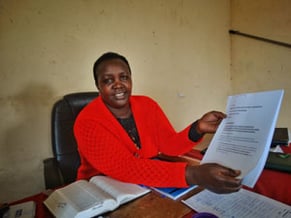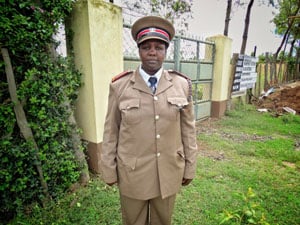 |
| Chief Julia shares her Celebrating Families methodology |
The tranquility of Chief Julia Mwihaki Kamau’s office was quite noticeable. Her office looked like a counselling room, unlike that of a typical chief’s camp anywhere in Kenya. Most chiefs’ camps are noisy and crowded, usually a holding ground for offenders before they are taken to police cells or arraigned in courts.
As Chief Julia, 49, introduced herself, she told us about the guests she had attended to before I arrived. “The three ladies are widows of a deceased man and are fighting for equal distribution of his wealth,” she says.
“It’s been a journey that I have walked with this family, who initially could not talk to each other. It was worse dealing with the man’s twenty children, who almost fought in my office.” She continues, “I decided to deal with their mothers and now we are almost at the tail end of this succession. You saw the widows were laughing together as they left my office. You can imagine the peace and harmony the children will enjoy once the case is over.”
Intrigued by the methodology she used to calm the family, I wanted to find out who Chief Julia was. “I come from a humble background. We moved to this area-Kamatunga sub location-20 years ago,” Julia says. This area is now under her jurisdiction as chief of Mweiga. “My husband was a caretaker of a farm and I used to be house help. I trusted that one day God would uplift my family, and if ever I got a job someday, I would help the people of this locality come out of their bondage,” she says.
Mweiga was known as home for alcoholism, drug abuse and spousal abuse, resulting in too many children being neglected. Julia witnessed many families separating, while others killed each other over inherited property. She applied for and received the chief position. She remembers the vow she made to God to help the broken families.
 |
| Julia in her official chief uniform |
Knowing the vulnerabilities of the community, World Vision Kenya began working in the area. They launched a Christian Discipleship program called the Transformed Church for Transformed Communities (TCTC) Project. Under TCTC, pastors, care-givers, parents, Sunday school teachers and patrons of Bible clubs were offered short-term training that focused on changing people’s mindsets on issues affecting the community.
One of the models used in TCTC is the Celebrating Families curriculum (CF). This model empowers parents and caregivers to create a protective, nurturing and loving environment, which affects how children learn and think about God.
As a parent, Chief Julia attended the CF training and it marked a turning point as she began to structure her focus on restoring broken relationships in her community. “In fact, the methodology that I apply when trying to arbitrate over disputes is what CF taught me,” she says. “I usually use the four steps we learned, namely: addressing the past, present, future and then allowing the families to sow the seed of goodness in their lives, once they have forgiven each other.” She says, “I view the CF training as being a godsend opportunity for me to help reconcile my people to each other and God. It helped me understand the issues that families go through and how to settle them amicably.”







